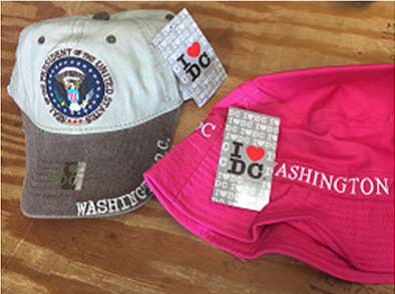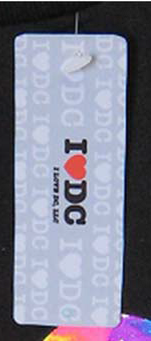In a case before the Trademark Trial and Appeal Board (“Board”), the Board cancelled and abandoned the trademark registration and trademark application for the ![]() and
and  marks owned by an individual, Jonathan A. Chien (“Chien”) on the ground that the marks do not function as a trademark.
marks owned by an individual, Jonathan A. Chien (“Chien”) on the ground that the marks do not function as a trademark.
Chien filed for the mark ![]() for various clothing items in Class 25 on March 18, 2010. Chien had previously obtained registration for the mark
for various clothing items in Class 25 on March 18, 2010. Chien had previously obtained registration for the mark  on the Supplemental Register for clothing goods in Class 25, backpacks in Class 18, and stuffed toys in Class 28. Chien claimed black and red as a feature of the challenged marks, and disclaimed “DC” meaning, Chien was not claiming the exclusive right to use “DC” in that it is a geographic term apart from the mark as a whole. Opposer D.C. One Wholesaler, Inc. (“D.C. One”) opposed registration of
on the Supplemental Register for clothing goods in Class 25, backpacks in Class 18, and stuffed toys in Class 28. Chien claimed black and red as a feature of the challenged marks, and disclaimed “DC” meaning, Chien was not claiming the exclusive right to use “DC” in that it is a geographic term apart from the mark as a whole. Opposer D.C. One Wholesaler, Inc. (“D.C. One”) opposed registration of ![]() and sought to cancel
and sought to cancel  on the grounds that the designations failed to function as trademarks.
on the grounds that the designations failed to function as trademarks.
Standing
To bring any claim before the Board, a party must first establish that it has standing, or a real interest in the proceeding and a reasonable basis for believing that it will be damaged by registration of the challenged mark. Here, the Board found D.C. One had a reasonable basis for believing that it will be damaged given that it used a similar design to the challenged marks and because some tourists and vendors were reluctant to purchase such goods from D.C. One because the goods were thought to be illegal. Thus, D.C. One had standing to bring its claims.
Failure to Function as a Trademark
Not every designation functions as a trademark. The crucial inquiry is how the designation would be perceived by the relevant purchasing public. To qualify as a trademark, a designation must be used in a manner calculated to be perceived by the public as identifying the source of the goods in question rather than as an ornamental or decorative aspect of the product or as being merely informational.
D.C. One had submitted evidence that I ♥ DC was widely used by third parties over several years as an expression of enthusiasm for the city of Washington, D.C. Such use of the term I ♥ DC was displayed in a large font covering most of the product (whether on a shirt or stuffed animal) and in black lettering with a red heart, which was similar to how Chien had used the marks. D.C. One also submitted evidence that the expression I ♥ _____ had been widely used on souvenirs to express enthusiasm with respect to other locations and things, e.g., I ♥ EXCEL, I ♥ NURSING, I ♥ PROBLEM SOLVING, I ♥ TX, or I ♥ NERDS.
The Board found that the evidence of record showed that in the field of souvenirs, the designation I ♥ DC is displayed in a prominent ornamental feature of the goods such that consumers would likely purchase the goods because of the message rather than because the goods were associated with a specific source. The Board also found that Chien could not demonstrate that his use of the term I ♥ DC was exclusive or as effectively identifying him as the source of the products.
Chien argued that he used the term I ♥ DC in a non-ornamental manner on hangtags and labels, including those shown below, which showed he was using the term as a trademark:


The Board disagreed as the ultimate question was whether the designation I ♥ DC signifies the source of the goods sold. Here, the phrase I ♥ DC will be perceived as merely informational given the widespread ornamental use of the phrase by third parties as a way to signify enthusiasm for D.C. Thus, the term I ♥ DC does not create the commercial impression of a source indicator, regardless of whether it is displayed on a hangtag, label, or on the products in question. For the foregoing reasons, the Board found that I ♥ DC failed to function as a trademark.
This decision shows the importance of assessing whether a designation is likely to be perceived by the public as an ornamental or decorative aspect of the product or as merely informational, which is not registrable, or as source identifier. This decision is also instructive as it shows how the use of a designation by third parties may impact the scope of rights of a trademark owner. The decision could impact other owners of I ♥ __marks, such as I ♥ NY.

